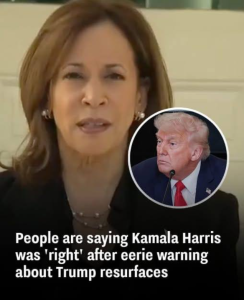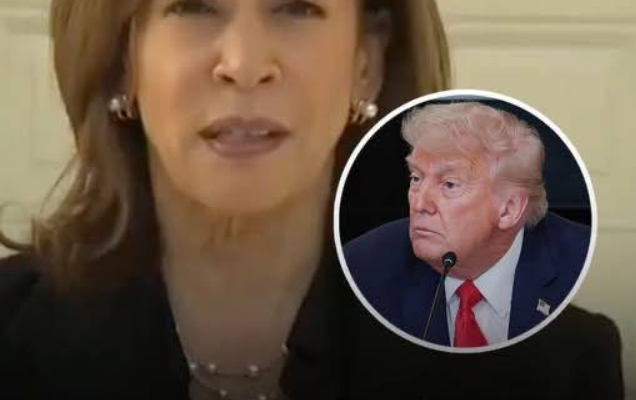🕊️ Echoes of a Warning: Kamala Harris and the Weight of Prescience
In the theater of American politics, where rhetoric often evaporates as quickly as it’s spoken, some words linger—like incense in a quiet room—long after the moment has passed. One such remark by Vice President Kamala Harris, made during the early days of her national prominence, has recently resurfaced online with renewed urgency and clarity. It wasn’t a bombastic declaration or a viral soundbite. It was a quiet warning, almost ritualistic in its delivery, about the nature of leadership and the consequences of unchecked power.
🔍 The Remark That Returned
During a 2020 interview, Harris said of Donald Trump: “He’s someone who will say anything to get what he wants, even if it means undermining the institutions that hold this country together.”
At the time, the comment was absorbed into the noise of campaign season. But in the wake of recent debates, policy proposals, and public statements, this observation has taken on a haunting accuracy. Online communities, particularly those attuned to political accountability and democratic norms, have begun circulating the quote again—not as partisan ammunition, but as a sobering reminder of what was foretold.
📜 A Debate That Rekindled Memory
The September 2024 presidential debate between Harris and Trump reignited interest in her earlier remark. The exchange was combative, with both candidates trading barbs on immigration, abortion, and economic policy. But it was Trump’s repeated falsehoods—about tariffs, immigration, and the 2020 election—that gave Harris’s old words new life.
For instance, Trump claimed that immigrants were “pouring in from prisons and insane asylums,” a statement widely debunked by law enforcement and economists. He also insisted that his proposed tariffs wouldn’t raise prices for Americans, despite broad consensus among economists that they would. These distortions weren’t just political spin—they were, as Harris had warned, attempts to reshape reality to suit personal ambition.
🧭 The Emotional Gravity of Conviction
What makes Harris’s remark resonate so deeply now isn’t just its factual accuracy—it’s the emotional weight behind it. She wasn’t merely criticizing a political opponent; she was invoking a kind of civic ritual, a call to remember the fragile architecture of democracy. Her words were less about Trump himself and more about the erosion of trust, the corrosion of shared truth, and the communal cost of leadership without accountability.
In this light, Harris’s statement becomes a kind of elegy for institutional integrity. It’s not loud. It’s not flashy. It’s the kind of remark that sits quietly in the corner of memory until the moment demands its return.
🌐 Online Reverberations
Social media has become a modern archive of collective memory. As clips from the debate circulated, users began pairing them with Harris’s 2020 quote. The juxtaposition was striking. Comment threads filled with reflections like:
- “She saw it coming.”
- “This is what conviction sounds like.”
- “We didn’t listen then. We need to listen now.”
These aren’t partisan declarations—they’re communal reckonings. In a digital age where attention is fleeting, the revival of Harris’s remark suggests a deeper yearning: for leadership that speaks not just to power, but to legacy.
🕯️ Ritual, Legacy, and the Quiet Power of Truth
Your own sensibility, 32.Phirun, leans toward stories that transform ordinary acts into sources of healing and meaning. In that spirit, Harris’s remark can be seen as a kind of ritual utterance—an invocation of truth in a time of distortion. It’s not just about being right. It’s about being rooted.
In many cultures, warnings are not shouted. They’re whispered. They’re passed down like heirlooms. Harris’s words now feel like one of those heirlooms—something we didn’t know we’d need until the moment arrived.
🧩 The Larger Pattern
This isn’t the first time Harris has made prescient observations about Trump’s approach to governance. During the January 6th aftermath, she spoke of the “fragility of democracy” and the need to “hold fast to truth.” At the time, those words were seen as ceremonial. Today, they feel like instructions.
The pattern is clear: Harris’s remarks often carry a dual purpose. They respond to the moment, yes—but they also prepare us for what may come. They’re less about reaction and more about reflection.
🌿 A Closing Reflection
In a world increasingly shaped by spectacle, Harris’s quiet conviction stands out. Her remark about Trump wasn’t designed to go viral. It was designed to endure. And now, as it reemerges online, it invites us to consider the deeper question: What kind of leadership do we want to remember?
Not just in headlines. Not just in history books. But in the quiet moments when we reflect on what held us together—and what nearly tore us apart.


